初中英语从句(全)
【英语】中考考点_状语从句知识点汇总(全)
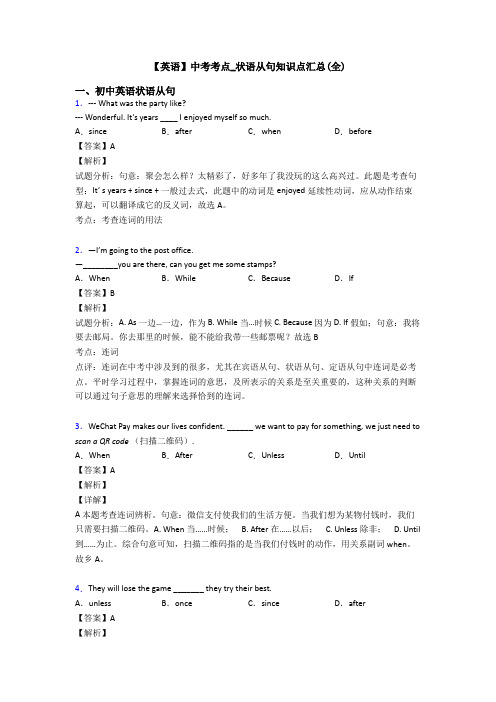
【英语】中考考点_状语从句知识点汇总(全)一、初中英语状语从句1.--- What was the party like?--- Wonderful. It’s years ____ I enjoyed myself so much.A.since B.after C.when D.before【答案】A【解析】试题分析:句意:聚会怎么样?太精彩了,好多年了我没玩的这么高兴过。
此题是考查句型:It’ s years + since + 一般过去式,此题中的动词是enjoyed延续性动词,应从动作结束算起,可以翻译成它的反义词,故选A。
考点:考查连词的用法2.—I’m going to the post office.—________you are there, can you get me some stamps?A.When B.While C.Because D.If【答案】B【解析】试题分析:A. As 一边…一边,作为 B. While当…时候 C. Because 因为 D. lf假如;句意:我将要去邮局。
你去那里的时候,能不能给我带一些邮票呢?故选B考点:连词点评:连词在中考中涉及到的很多,尤其在宾语从句、状语从句、定语从句中连词是必考点。
平时学习过程中,掌握连词的意思,及所表示的关系是至关重要的,这种关系的判断可以通过句子意思的理解来选择恰到的连词。
3.WeChat Pay makes our lives confident. ______ we want to pay for something, we just need to scan a QR code(扫描二维码).A.When B.After C.Unless D.Until【答案】A【解析】【详解】A 本题考查连词辨析。
句意:微信支付使我们的生活方便。
当我们想为某物付钱时,我们只需要扫描二维码。
A. When当……时候; B. After在……以后; C. Unless除非; D. Until 到……为止。
初中英语条件状语从句知识点总结(超全)
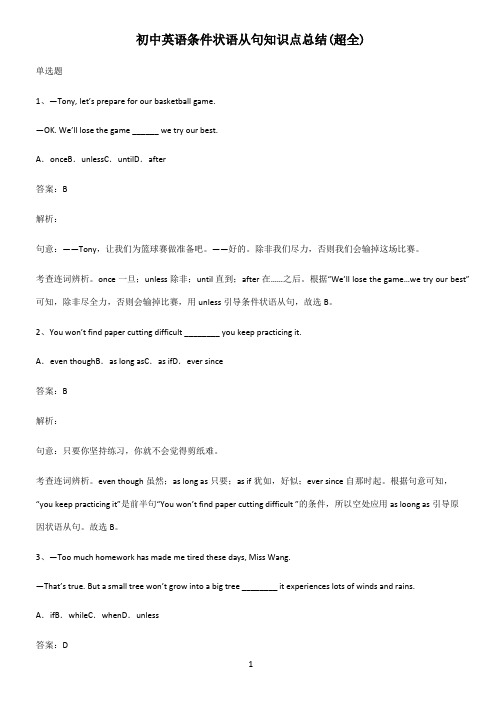
初中英语条件状语从句知识点总结(超全)单选题1、—Tony, let’s prepare for our basketball game.—OK. We’ll lose the game ______ we try our best.A.onceB.unlessC.untilD.after答案:B解析:句意:——Tony,让我们为篮球赛做准备吧。
——好的。
除非我们尽力,否则我们会输掉这场比赛。
考查连词辨析。
once一旦;unless除非;until直到;after在……之后。
根据“We’ll lose the game…we try our best”可知,除非尽全力,否则会输掉比赛,用unless引导条件状语从句,故选B。
2、You won’t find paper cutting difficult ________ yo u keep practicing it.A.even thoughB.as long asC.as ifD.ever since答案:B解析:句意:只要你坚持练习,你就不会觉得剪纸难。
考查连词辨析。
even though虽然;as long as只要;as if犹如,好似;ever since自那时起。
根据句意可知,“you keep practicing it”是前半句“You won’t find paper cutting difficult ”的条件,所以空处应用as loong as引导原因状语从句。
故选B。
3、—Too much homework has made me tired these days, Miss Wang.—That’s true. But a small tree won’t grow into a big tree ________ it experiences lots of winds and rains. A.ifB.whileC.whenD.unless答案:D解析:句意:——王老师,这些天太多的作业使我感到很累。
(全)初中英语-巧变宾语从句
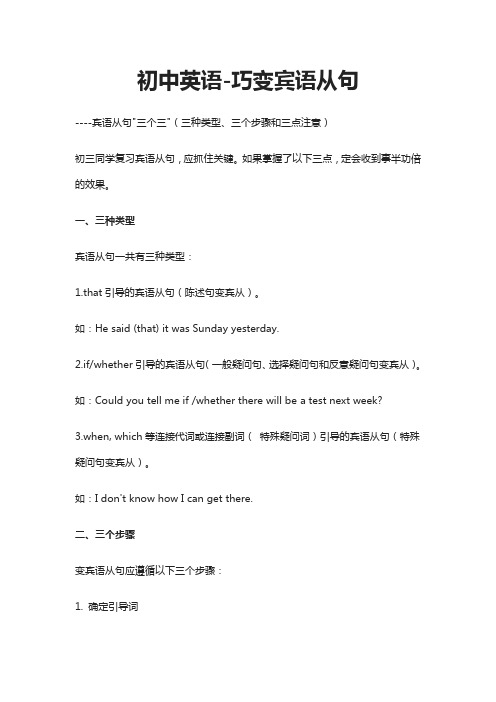
初中英语-巧变宾语从句----宾语从句"三个三"(三种类型、三个步骤和三点注意)初三同学复习宾语从句,应抓住关键。
如果掌握了以下三点,定会收到事半功倍的效果。
一、三种类型宾语从句一共有三种类型:1.that引导的宾语从句(陈述句变宾从)。
如:He said (that) it was Sunday yesterday.2.if/whether引导的宾语从句(一般疑问句、选择疑问句和反意疑问句变宾从)。
如:Could you tell me if /whether there will be a test next week?3.when, which等连接代词或连接副词(特殊疑问词)引导的宾语从句(特殊疑问句变宾从)。
如:I don't know how I can get there.二、三个步骤变宾语从句应遵循以下三个步骤:1. 确定引导词根据从句的句子类型选择正确的引导词:如从句为陈述句则引导词为that(that 在口语中常省略);如从句是一般疑问句、选择疑问句或反意疑问句,则引导词为if或whether;如从句是特殊疑问句,则引导词为特殊疑问词本身。
2. 调整语序宾语从句永远是陈述句语序。
如原句是疑问句,则应调整为陈述句语序。
如:1) Is he going to the shop? I want to know. (改为宾语从句)I want to know if/whether he is going to the shop.2) When does he get up? Do you know? (改为宾语从句)Do you know when he gets up?3. 变换时态A. 如主句动词是一般现在时或一般将来时,则宾语从句根据实际情况用所需要的任何时态。
如:1) He says (that) he will finish the work tomorrow.2) I think (that) they have already gone to Beijing.B. 如主句动词是一般过去时,则宾语从句动词的时态用过去时的某种形式(如,一般过去时、过去进行时、过去完成时、过去将来时等。
初中英语语法——三大从句汇总(重点笔记)
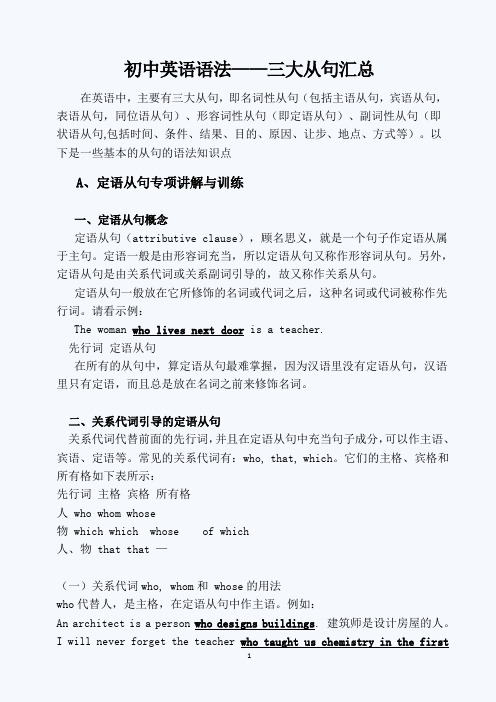
初中英语语法——三大从句汇总在英语中,主要有三大从句,即名词性从句(包括主语从句,宾语从句,表语从句,同位语从句)、形容词性从句(即定语从句)、副词性从句(即状语从句,包括时间、条件、结果、目的、原因、让步、地点、方式等)。
以下是一些基本的从句的语法知识点A、定语从句专项讲解与训练一、定语从句概念定语从句(attributive clause),顾名思义,就是一个句子作定语从属于主句。
定语一般是由形容词充当,所以定语从句又称作形容词从句。
另外,定语从句是由关系代词或关系副词引导的,故又称作关系从句。
定语从句一般放在它所修饰的名词或代词之后,这种名词或代词被称作先行词。
请看示例:The woman who lives next door is a teacher.先行词定语从句在所有的从句中,算定语从句最难掌握,因为汉语里没有定语从句,汉语里只有定语,而且总是放在名词之前来修饰名词。
二、关系代词引导的定语从句关系代词代替前面的先行词,并且在定语从句中充当句子成分,可以作主语、宾语、定语等。
常见的关系代词有:who, that, which。
它们的主格、宾格和所有格如下表所示:先行词主格宾格所有格人 who whom whose物 which which whose of which人、物 that that —(一)关系代词who, whom和 whose的用法who代替人,是主格,在定语从句中作主语。
例如:An architect is a person who designs buildings. 建筑师是设计房屋的人。
I will never forget the teacher who taught us chemistry in the firstyear of my senior middle school.我将永远不会忘记在高一时教我们化学的那位老师。
Anyone who wants to apply for this job must send us the resume by email first. 想应聘这个职位的任何人都必须先通过电子邮件向我们发送简历。
初中英语知识点总结:定语从句(最新最全)
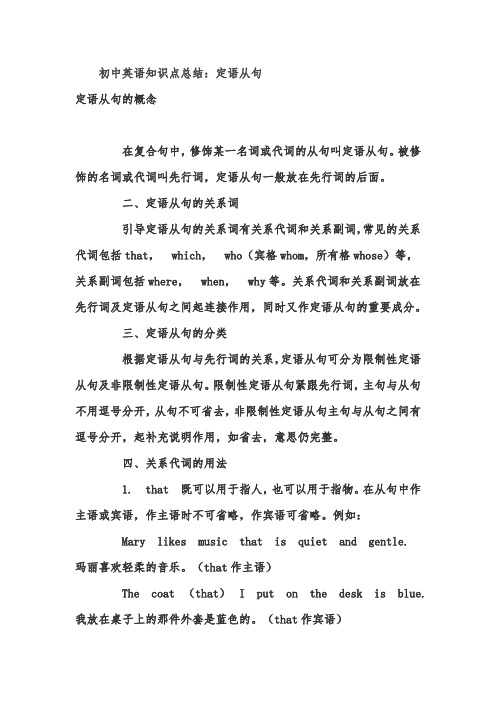
初中英语知识点总结:定语从句定语从句的概念在复合句中,修饰某一名词或代词的从句叫定语从句。
被修饰的名词或代词叫先行词,定语从句一般放在先行词的后面。
二、定语从句的关系词引导定语从句的关系词有关系代词和关系副词,常见的关系代词包括that,which,who(宾格whom,所有格whose)等,关系副词包括where,when,why等。
关系代词和关系副词放在先行词及定语从句之间起连接作用,同时又作定语从句的重要成分。
三、定语从句的分类根据定语从句与先行词的关系,定语从句可分为限制性定语从句及非限制性定语从句。
限制性定语从句紧跟先行词,主句与从句不用逗号分开,从句不可省去,非限制性定语从句主句与从句之间有逗号分开,起补充说明作用,如省去,意思仍完整。
四、关系代词的用法1. that 既可以用于指人,也可以用于指物。
在从句中作主语或宾语,作主语时不可省略,作宾语可省略。
例如:Mary likes music that is quiet and gentle.玛丽喜欢轻柔的音乐。
(that作主语)The coat (that)I put on the desk is blue.我放在桌子上的那件外套是蓝色的。
(that作宾语)2.which用于指物,在句中作主语或宾语,作主语不可省略,作宾语可省略。
例如:The building which stands near the train station i s a supermarket.位于火车站附近的那座大楼是一家超市。
(作主语)The film (which)we saw last night was wonderful . 我们昨天晚上看的那部电影很好看。
(作宾语)3.who,whom用于指人,who 用作主语,whom用作宾语。
在口语中,有时可用who代替whom,也可省略。
例如:The girl who often helps me with my English is f rom England.经常在英语方面帮助我的那个女孩是英国人。
初中英语从句

初中英语从句在初中英语中,从句是一个非常重要的语法结构。
从句可以作为主句的一部分,用来表达更加复杂的意思。
常见的从句有名词性从句、形容词性从句和副词性从句。
1. 名词性从句(Noun Clauses):名词性从句在句子中充当名词的角色,可以作为主语、宾语、表语或同位语。
- 主语从句(Subject Clause):例如:What he said is true.(他说的是真的。
)- 宾语从句(Object Clause):例如:She asked where I lived.(她问我住在哪里。
)- 表语从句(Predicate Nominative Clause):例如:His dream is that he can become a doctor.(他的梦想是成为一名医生。
)- 同位语从句(Appositive Clause):例如:The fact that he passed the exam surprised everyone.(他通过了考试的事实让每个人都感到惊讶。
)2. 形容词性从句(Adjective Clauses):形容词性从句用来修饰名词或代词,通常用来描述或限定名词的属性或特征。
- 关系代词引导的形容词性从句:例如:The book that you recommended is veryinteresting.(你推荐的那本书非常有趣。
)- 关系副词引导的形容词性从句:例如:He lives where the air is fresh.(他住在空气新鲜的地方。
)3. 副词性从句(Adverb Clauses):副词性从句用来修饰动词、形容词或副词,并且表达时间、地点、原因、条件、目的、结果等。
- 时间状语从句(Adverbial Clause of Time):例如:I will call you when I arrive.(我到达时会给你打电话。
)- 地点状语从句(Adverbial Clause of Place):例如:I will stay where I am.(我会待在原地。
初中英语语法-英语从句总结
初中英语语法总结(从句)英语从句三大类型按一般说法,可分为三大类14种从句。
一,名词性从句1主语从句Whether it’s right or not remains to be seen。
2宾语从句I wonder whether it's right or not.3同位语从句This is a question whether it's right or not. 4表语从句The question is whether it's right or not。
二,定语从句1限定性定语从句She is the student who can speak English well。
2非限定性定语从句She is the student, who can speak English well。
三,状语从句1时间状语从句The fact will come out when he comes here。
2地点状语从句You can go wherever you like。
3原因状语从句Pay more attention to your lessons because you are astudent。
4方式状语从句He walks as if he were a king.5目的状语从句She went to Japan so that she could learn Japanese well. 6结果状语从句She went to Japan so that she learned Japanese well.7条件状语从句I will understand it if he tells me.8让步状语从句He knows a lot though he is little.1.定语从句There are some old books in the box.The boy dressed in blue is from America。
初中英语重点语法三大从句总结
初中英语重点语法三大从句总结初中英语中,主要有三大从句,即宾语从句、定语从句、状语从句(包括时间、条件、结果、目的、原因、让步、地点、方式等)。
1宾语从句在句子中起宾语作用的从句叫做宾语从句。
that: I think that you can pass the exam. Whether/if: I don’t know what the word means. “Wh”: I don’t know what the word means.I don’t know where he found the book.只用whether的情况:1. 与or not连用:I don’t know whether it’s raining or not.2. 与动词不定式连用:He doesn’t know whether to accept the invitation.3. 连接词前有介词时:It depends on whether he is coming.1. 主句是一般现在时态,从句根据实际情况而定(各种时态均可)She wants to know what he has done for the exam.2.主句是一般过去时态,从句用相应的过去的时态。
1)She said that she was a student.2)She said that she would fly to Japan in a week. 3)She said that she had finished her homework already.3. 如果宾语从句说的是客观真理、自然现象或事实时,这时宾语从句要用一般现在时态。
The teacher said that the earth goes round the sun.2定语从句在复合句中修饰名词、代词的从句叫定语从句。
先行词指人 who /that先行词指物 which/ that定语从句一般紧跟被修饰的名词或代词(即先行词)后关系代词代替先行词在句子中担当成分,所以从句中不可再出现其他代替先行词的代词Whom: 先行词指人,则代替先行词在定语从句中充当宾语(包括介词的宾语), 与who的区别是如果前面带介词则必须用whom1. This is the teacher whomwho we like best.2. I don’t like the boy to whom you are talking.Whose :指人或物,作定语,表示“…的”eg: Harry is the boy whose mother is our math teacher.关系代词只能 that 的特殊情况:1.先行词前有序数词修饰时:This is the first gift that my parents bought me.2.先行词前有形容词最高级修饰时:This is the most exciting film that I have ever seen.3. 先行词是不定代词something, anything等时.e.g. Is there anything that you want i n this shop4. 先行词是人和物时, 用that.e.g.He talked about some writers and books that were unknown to us all.5. 先行词被all , little , the only , the very(就是,正是), the last 等词修饰时,只能用thate.g. This is the last place that I want to visit.6. 特殊疑问句以who 或which 开头,只能用that引导.Who is the girl that is making a speech on the platform?当关系代词前使用介词时:物+介词+which ; 人+ 介词 + whom当关系代词前使用介词时:e.g. 1. This is the train by which we went to Beijing.2. This is the teacher to whom my mother is talking.3状语从句在复合句中由从句表示的状语称作状语从句,它可以用来修饰谓语(包括非谓语动词)、定语或状语,或是整个句子。
初中英语知识点总结从句
初中英语知识点总结从句初中英语从句知识点总结一、从句的定义从句是指在一个句子中充当某一成分的句子。
它不能独立成句,需与其他句子部分连接使用。
根据其在句中的功能,从句可分为名词性从句、定语从句和状语从句。
二、名词性从句名词性从句在句子中的功能与名词相似,可以作主语、宾语、表语或同位语。
根据其引导词的不同,名词性从句又可分为以下几类:1. 连接词that引导的名词性从句That通常不担任从句中的任何成分,只起连接作用。
例如:- What he wants is that we can help him.(他想要的是我们能帮助他。
)2. 连接代词who, whom, whose, what, which引导的名词性从句这些连接代词在从句中担任主语、宾语或定语。
例如:- Who will go to the party is not decided yet.(谁将去派对还没有决定。
)- The book which you lent me is lost.(你借给我的那本书丢了。
)3. 连接副词when, where, why, how引导的名词性从句连接副词在从句中作状语。
例如:- When the meeting will be held has been announced.(会议何时举行已经宣布了。
)- I don’t know why he is late.(我不知道他为什么迟到了。
)三、定语从句定语从句修饰名词或代词,通常紧跟在它所修饰的词之后。
引导定语从句的关系词有关系代词who, whom, whose, which, that和关系副词when, where, why, how。
1. 以关系代词引导的定语从句- The man who/that is standing there is my teacher.(站在那里的那个人是我的老师。
)- The book which/that you are reading is very interesting.(你正在读的那本书很有趣。
初中英语语法大全:10 状语从句
初中英语语法大全:状语从句1状语从句在复合句中,修饰主句中的动词、形容词或副词等的从句叫状语从句。
状语从句根据它表达的意思可分为时间、地点、原因、目的、结果、让步、比较(或方式)和条件等类。
1.时间状语从句引导连词有when,while,till,not…until,since,after ,before ,as soon asThe bus won’t start until everybody gets on.公共汽车直到每人都上车为止,才开动。
When he knocked at the door I was cooking.当他敲门时,我正在煮饭。
Last night before he came back home, his wife had already cooked dinner and waited for 2 hours.昨天晚上在他回到家之前,他的妻子已经做好晚饭足足等了他两小时之久。
After I went to church, I went shopping.2. 地点状语从句地点状语从句通常由where, wherever 引导。
Where there is a will, there is a way. 哪里有志向,哪里就有出路。
有志者事竟成。
Where there is a life, there is a hope. 哪里有生命,哪里就有希望。
留得青山在,不怕没柴烧。
Wherever you go, whatever you do, I will be right here waiting for you.不管你去哪里,不管你做什么,我都会在此守侯你。
v3.原因状语从句引导连词有because,as, since。
He didn′t see the film because he had seen it.他没有看那部电影,因为他已经看过了。
They couldn’t get on the train,for it was too crowed.比较:because, since, as和for1)because语势最强,用来说明人所不知的原因,回答why提出的问题。
- 1、下载文档前请自行甄别文档内容的完整性,平台不提供额外的编辑、内容补充、找答案等附加服务。
- 2、"仅部分预览"的文档,不可在线预览部分如存在完整性等问题,可反馈申请退款(可完整预览的文档不适用该条件!)。
- 3、如文档侵犯您的权益,请联系客服反馈,我们会尽快为您处理(人工客服工作时间:9:00-18:30)。
名词性从句分为主语从句、宾语从句、表语从句和同位语从句。
其他从句还有定语从句(关键),状语从句。
定语从句:一、结构先行词+关系词+从句二、关系词关系词分为关系代词和关系副词关系代词:that ,which ,who ,whom ,whose关系副词:where (=in/on/at which) ,why (= for which) ,when (=in/on which) 例句:1. The man who/that is standing here is Tom.2.The man that/who/whom/或者省略he is talking to is Tom.3. The man to whom he is talking is Tom.(介词后必须加宾格并且不能省略)4. The man , whose father is a teacher went abroad.5.The man ,the father of whom is a teacher went abroad.6.The man, of whom the father is a teacher went abroad.总结:……., whose +n….和….., the n of which(指物)/whom(指人)…以及…, of which/whom the n 这三个句型可以相互转换。
三、只能用that不能用which的情况1.既有人又有物:the teachers and the schools that….2.有不定代词或者有不定代词修饰时:I will tell you everythin g that….I will tell you all the things that….3.最高级修饰或者序数词修饰时:The most beautiful flowers that….The first man that…4.避免重复Who is the man that is standing here?Which is the book that I like?5.有only/very/just then 修饰时He is the only one that/who is fit for …This is the only book that I want to buy.6.先行词充当表语时Tom isn’t the boy that he used to be.(定语从句,先行词boy在句子中作为表语)Tom isn’t what he used to be.(表语从句)四、只用which不能用that的情况1.非限制性定语从句(用逗号隔开的一般是非限制性定语从句)These apple trees,which I planted three years ago,have not borne any fruit.2.介词后用whichThere are 30 chairs in the small hall, most of which are new.3.避免重复The clock is that which tells the time.五、只用who不用that1.先行词为指人的代词:those , all ,one ,ones ,someone ,anyone ,no oneThose who win the game will get the prize.All who went there spoke highly of the park.2.there be 中先行词为人是只用whoThere is an old man who wants to see you.六、特殊的关系词as1.as 引导限制性定语从句时,一定充当主语或宾语或者表语。
She wear the same coat as her sister usually does.It is such an interesting film as we all like to see.(定语从句不完整,as充当宾语)It is such an interesting film that we all like to see it.(从句结构完整,这是状语从句)2.as引导非限制性定语从句As was expected ,he finished the task perfectly.The earth is around ,as we all know.The earth , as we all know , is around.As i s often the case,…..(情况往往是这样的)As is natural,….(很自然的)这些短语可以用于议论文写作。
七、特殊句型先行词充当主语时,注意主谓一致。
1.the number of the people who own cars is increasing.2.he is one of the students who have passed examination.He is the one of the students who has passed examination.3.i have two sisters, neither of whom are teachers.I have two sisters and neither of them are teachers.I have two sisters, neither of them teachers.4.there are some people in the garden ,whose owner was seated/sitting.there are some people in the garden ,it’s owner seated/sitting.there are some people in the garden and it’s owner was seated.5.is this the factory that/which/或者省略you visited yesterday?Is this the factory to which you paid a visit?Is this the factory where you worked?Is this the factory, the one which/that/可以省略you visited?Is this the factory, the one to which you paid a visited?Is this the factory, the one where/in which you worked?6.the house whose roof was damaged has been repaired now.The house , the roof of which was damaged has been repaired now.The house of which the roof was damaged has been repaired now.7.This is the reason why/for which I did it.This is the reason that/which he told me.8.I hate the way in which/that/可以省略he spoke to his father.(way句子中作状语)That‘s the way which/that/可以省略you told me.(way句子中作宾语)He gave me the way which/that is not practical.(way在从句中作主语)9.she is so clever a girl that she learns everything quickly.She is so clever a girl as learns everything quickly.状语从句一、时间状语从句When/while/as 都可以跟持续性动词As/when/while I was walking down the street, I meet my friend.各个连词的区别:1. when●从属连词,可以引导持续性或者短暂性动词,表明主句、从句动作同时发生或者从句动作在主句之前。
When I lived there ,I used to go to the seaside.(主从句动作同时发生)When the film ended , people went home.(从句动作在主句之前)●并列连词Be doing….when….Be about to do…. When….I was doing homework when the light went off.I was about to jump into the river when he stopped me.●表示原因、作“既然”的意思How could you expect to learn anything when you didn’t listen in class.It was foolish of you to take a taxi when you could easily walk there in 5 minutes.2.while●只引导持续性动词Don’t talk too aloud while others are working.●并列连词,作“而,却”的意思He likes pop music while I am fond of folk music.●作“尽管,虽然”的意思While I admit there are problems, I d on’t agree that they can’t be solved.3.as●主句从句动作同时发生或者交替发生,作“一边。
一边。
”,“随着。
”的意思As time goes on,…….He hurried home, looking behind as he went.4.as soon as=the moment=the minute=the instant=immediately=directly= instandlyI’ll tell him the news as soon as he comes.5.no sooner…than…=hardly/scarily/barely…when…倒装句,主句用had done过去完成时。
